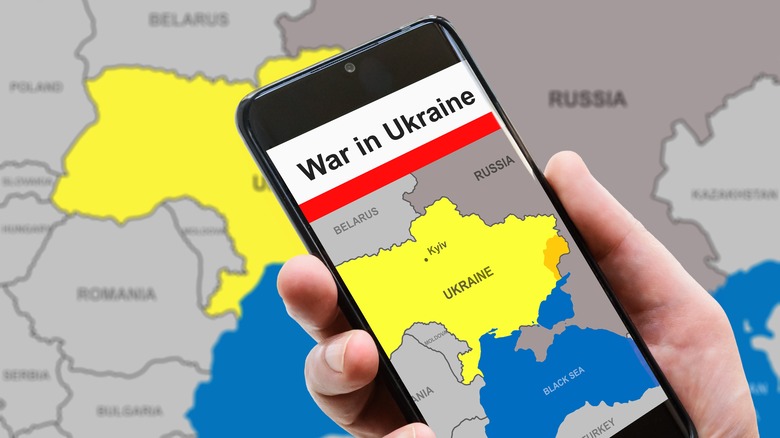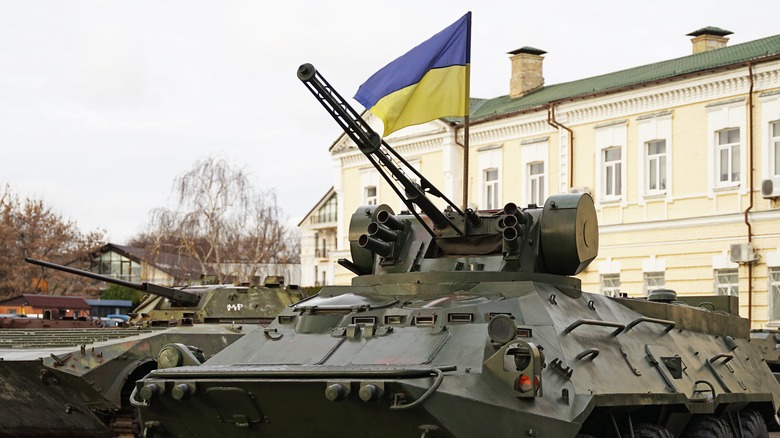The Ominous Cell Phone Warning Ukraine Is Giving Their Soldiers
Several long weeks have passed since Russia first invaded Ukraine, and unfortunately, it seems the war is not even close to coming to an end. In times of conflict, a lot of things come to light that civilians may not be aware of on a day-to-day basis. One such matter impacting Ukraine is the weaponization of cell phones. Ukrainian soldiers recently received a lengthy list of warnings related to using their mobile phones in a safe way. The consequences of not following those guidelines could be dire. But why exactly are smartphones, and mobile phones in general, such a threat on the frontlines?
Warfare in modern times is much different than the wars we've all learned about in history books. There are still tanks and missiles, wreaking destruction and hurting millions of innocent lives. Unfortunately, that has not changed. However, one thing that is different is the fact that we now live in a digital world, full of various digital signals, the internet, and countless ways for people to be tracked by skilled military personnel and specialized equipment.
During World War I and World War II, lighting a cigarette at night was one of the most careless things a soldier could do on the frontline. Even the smallest spark of light in an otherwise dark, quiet place could result in alerting the enemy to the army's exact location — and the consequences were dire. But now, in 2022, faint specks of light have been replaced by signals we cannot even see, ones that come from the phones we carry daily.
Phone masts are turned into deadly tracking devices
Something as small as a smartphone could be a dangerous weapon when taken over by the enemy, Ukrainian soldiers have been told. There are several reasons why using a mobile phone during the war can prove gravely dangerous. Both sides of the conflict are using technology that helps them track the enemy using information coming from their respective cellular networks. Making a phone call is akin to sending out a smoke signal, only the enemy doesn't even have to be nearby in order to spot it. All the information is delivered to them through a series of devices.
The technology responsible involves devices called "cell-site simulators." The Russian war on Ukraine is obviously not the first instance of these devices being used, and these simulators are also located in the U.S; they emit signals that simulate a phone mast and they can be found inside drones and trucks. Being fully mobile, these devices can easily be moved from place to place as required and are able to follow along the battlefield lines. Once stationed in the desired area, a cell-site simulator begins to pick up signals coming from all the phones in its vicinity. In the case of drones, they are able to safely fly over the frontline, although obviously, they can be shot down if spotted. Trucks don't even need to be that close and usually make it unscathed. Russia uses drones and trucks for this technology.
These simulators then prompt nearby phones to connect to several phone masts in the area. This allows them to measure the strength of the signal coming from each phone and toward each mast. As every mast has its own location and a phone will respond to it in a stronger or weaker way depending on its position, it's very easy to pinpoint the user's approximate location based on the information collected by the drones and trucks planted in the area.
A smartphone can be used for tracking and spying on calls
Knowing the target's near-exact location is enough for the opposing army to send a series of missiles in that direction, and by that time, it may be too late to run. Unfortunately, even phones that are technically switched off may still be a threat in this situation — it's possible to hack a phone to make it appear to be off when it's in fact still on and transmitting dangerous signals to the enemies. The only way to prevent this would be to remove the battery from the phone, but modern smartphones often no longer offer user-removable batteries.
As a result of these threats, making a quick phone call to family is now a deadly risk for the soldiers in question, their fellow comrades, and local civilians. Not only are they likely to be tracked by location, but their phone calls may also be listened to at any given time. Even a private call to the family can carry valuable intel if the soldiers are not careful enough. Satellite internet is also at risk, and Elon Musk recently issued a warning to Ukrainians who use SpaceX's Starlink to connect to the internet.
In order to prevent all of the potentially disastrous consequences that come with using a phone during wartime, Ukrainian soldiers received a number of strict guidelines they need to follow. The order is as ominous as it is necessary.
Strict rules are required for the soldiers' safety
Nine different rules were issued, according to Sky News, each centered around the use of mobile phones anywhere near the frontlines. Ukrainian soldiers were advised to leave their own SIM cards at home and to instead buy a new one within the conflict zone. There is also a disclaimer that says soldiers shouldn't accept SIM cards from the locals, as there is a risk that a planted spy may be distributing cards for tracking and surveillance reasons. Regardless of the operator or SIM card type, the enemy may be listening to the calls at any given time, so short and non-specific conversations are required.
In order to make a phone call, the soldiers are told to walk at least 1,600 feet away from their squad positions. An armed friend should accompany them at all times and cover for them, as well, the advisory notes. Similarly, everyone is encouraged or even ordered to watch over each other and make sure that no one slips up and turns on their phone when it's not safe to do so. The calls should be made in areas with a lot of civilians, with a high preference for towns that were recently liberated from the Russian army.
Ukrainian soldiers have to drastically limit their phone usage, meaning much less contact with family than most of them would like. Families of those fighting on the frontline are often far away, some of them having fled the country, and they receive little information about their loved ones. That's what makes these rules all the more heartbreaking, but also very necessary.



